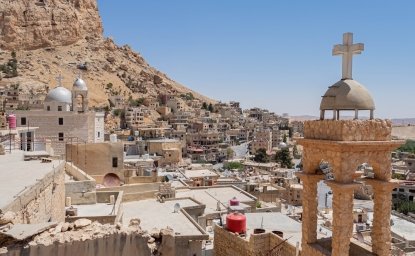Women Grade President Morsi's First 100 Days
October 17, 2012
This new series provides a platform for women to engage in a free and fluid exchange about pivotal Middle East issues. On October 8, Egyptian President Mohamed Morsi completed his first 100 days in office. For this piece, Egyptian women were asked the following question:
What are the successes and failures of President Mohamed Morsi’s government?
Rowida Omar, Executive Manager of the Egyptian Democratic Academy
Mohamed Morsi’s naming of a woman and a Coptic Christian as presidential advisers is a step towards representing all strands of political opinion and components of society. This is significant given his affiliation with the Muslim Brotherhood. Morsi’s creation of a complaints office to deal with public grievances shows his intention to satisfy the needs of ordinary citizens.
But I am not fully satisfied with President Morsi’s performance regarding freedom of speech. The government shut down a television station that criticized the Muslim Brotherhood. Articles critical of the Brotherhood or the Freedom and Justice Party were censored and not printed in state or independent publications. Security forces attempted to remove Mohammed Mahmoud’s graffiti which commemorated the Egyptian revolution. A journalist was tried for insulting the president and violence has been used against protestors critical of the government.
Afaf Gadalla, Elected Chair for Assiut Alliance for Women and Professor of Physics
Morsi succeeded in ending the military’s rule in Egypt and instilled more democracy into the government. Crime rates have also gone down since he took office. Morsi has made progress in collecting garbage from city streets and attracting more tourists to Egypt. But unemployment is still high and the economy has not improved. He has not replaced the corrupt officials running some government agencies.
Reham Afifi, Projects Manager of Free Egyptian Women’s Speak Up Group
President Morsi delivered a speech after first 100 days in office devoid of any vision or real substance. For two hours he presented false justifications for the economic situation. He gave an unrealistic analysis of a reality that only he and his supporters can see. Morsi has not solved any of the problems that he claimed to have made progress on such as traffic, garbage, safety problems and gas distribution. All of these issues are getting worse by the day. I believe he got himself into trouble by promising voters that he would solve such large issues during his first 100 days in office. But it was an even worse decision to give the Egyptian people a false perception of where the country stands. It is improper conduct for a president.
Howaida Nagy, Grants Manager at the American Development Foundation
The main success of President Morsi’s government was ending the military's rule. Morsi also changed the leadership of the Administrative Control Authority, a public sector watchdog. He appointed new governors to some provinces and selected a new head for the Central Agency for Organization and Administration.
The president failed to end the fuel shortage, collect garbage in the cities, decrease traffic or control the rise in prices. He also has not raised the minimum wage or enforced it.
Moushira Khattab, Former Egyptian Ambassador and Former Minister of Family and Population
President Morsi’s greatest success was providing what seems to be, on the surface, a relatively secure environment. Morsi's other important success was kick-starting talks with the International Monetary Fund for a $4.8 billion loan. The loan, along with economic reforms, are bound to put Egypt’s economy on the right track. The improved security situation should lead to an influx of foreign direct investment, which Egypt needs. Foreign investors are already eyeing Egyptian assets in the banking sector and others. On the international level, Morsi's foreign trips have been carefully planned to include countries such as Turkey, which could serve both as a model and a potential investor.
But President Morsi failed to tackle economic issues head on. His cabinet has not proposed a vision for Egypt that encourages people to return to work. This is the only way to alleviate poverty and save the ailing economy. Morsi also failed to quell labor protests and strikes. If strikes are not addressed swiftly, they could foil plans to attract foreign investment.
Finally, the government is running low on foreign currency reserves. Since January, the government has spent more than $20 billion in reserves to support the Egyptian pound. The currency has already devalued by ten percent. But a devalued currency would help make exports competitive. Morsi has yet to present specific solutions to Egypt’s economic problems. He also has not taken a clear stances on issues related to women or Coptic Christians.
Esraa Abdelfattah, Coordinator for the Egyptian Democratic Academy
President Mohamed Morsi’s most remarkable action taken during his first 100 days was forcing Minister of Defense Hussein Tantawi and other generals into retirement. It was a turning point in demilitarizing the Egyptian state. By cancelling the June 17 constitutional addendum, Morsi assumed powers that were previously in military hands. The army will no longer play a political role, or override the civilian government.
On the other hand, Morsi has shortcomings. Despite his promises to reform the Constituent Assembly, President Morsi attempted to shore up the Constituent Assembly before the Administrative Court's decision to dissolve it. Morsi ratified the law regulating the selection of members in order to give it legal immunity against being disbanded by the court. He never heeds the call to change by the different political forces within the assembly.
Intsar Saed, General Director of Cairo Center for Development
President Morsi’s failures outweigh his successes during his first 100 days in office. He took power away from the Supreme Council of the Armed forces, improved the security situation and released political prisoners. But he failed to present clear criteria for the selection of Constitution Committee members. There is still a shortage of diesel and gasoline. Morsi appointed 45 new editors-in-chief to state media, based on loyalty to him or ties to the Muslim Brotherhood. He also is drafting a new emergency law without revealing details to the public. Finally, he has failed to present a plan for job creation or improving.
Fadia Salem, Member of Parliament and Human Rights Committee
It is difficult to assess this period since President Morsi formed his government against a backdrop of endemic corruption of the state. I see him creating a climate for a new era in Egypt at the international and domestic levels. He sent the troops back to their barracks and started to implement a new electoral program and the rule of law.
The road is long and there are many challenges along the way. These challenges are even more difficult to overcome due to the government structure, which does not yet represent all Egyptians. Many state institutions still need to be rebuilt. But Egyptians have felt an improvement in security. Responsible security forces have decreased traffic and helped with the cleanliness of cities.




